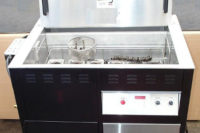What Do Adjusters Really Think of Contents Restoration?
A look into improving the contents restoration experience.

Photos courtesy of O’Donnell Brothers Professional Furniture Service.

Inexperienced contents companies might deem this item a total loss, with a replacement cost $17,000.

The desk was fully restored for $1,500.

Going the extra mile to prevent any damage to new flooring or carpeting.

An experienced restorer repairing the water-damaged base of a piece of furniture.

Properly padded and packed furniture moving truck, complete with tie-down bars.

Real time inventory helps manage the claim from start to finish.

Proper packing and warehousing minimizes damage.








I spent one afternoon this past week reaching out to adjusters to see how they really feel about contents and how they’re handled in insurance restoration. I received the following feedback from some true professionals in the industry:
- Snake in the grass
- A necessary evil
- How come moving companies are cheaper?
- Breaks down the claim into manageable portions
- Make sure experienced companies get called in to handle
- Inexperienced contents companies cause more trouble than they are worth
- 30% overcharge across the board
- Dislike inventories: typically inflated prices and ages
These comments and remarks tell an incredibly clear story. The insurance adjusters who deal with contents have a pretty dim view on the subject. They’ve typically come to their conclusions the hard way, by running into these issues on a day to day basis.
There are many reasons why contents are so hard to deal with. Some are listed in the opening of this article. Other reasons have their genesis in office chit chat and old war stories. My belief is that most of the problems in contents start with the experience level, or lack thereof, of the company that is sent out.
According to my research, adjusters have a multitude of reasons for dreading contents loss.
1) Ability to Control the Loss
Most losses are already assigned to a contents company by the time the contents adjuster receives the file. They feel that the beginning part of the claim is already out of their control. Decisions such as whether the loss should be done on site or packed out are already made for them.
2) Dislike Inventories & Total Loss
Once again, the adjuster feels that while the inventories and total loss are “necessary evils,” when they are done by the untrained person, they can create more problems than they solve. With ACV (actual cash value) and depreciation added to the process, the incomplete inventory is now a paperwork nightmare. This is especially true if the prices and ages are overinflated.
3) 30% Overcharge
One adjuster I spoke with did not hesitate when I asked the question, “What is the most frustrating part of a contents claim?” His immediate response was that all pack-outs and inventories are overcharged by 30%.
While I am sure that the adjuster is not 100% correct or 100% incorrect, I think that the middle ground is where the truth always lies.
4) “Inexperienced contents restoration companies cause more trouble than they are worth.”
I personally do not disagree with this statement at all. An inexperienced contents company can cost the insurance company claim dollars in lost labor hours, duplication of services and fees. This does not include any damage caused to the contents by inexperienced handling and storage.
My personal favorite answer to my question was: “A person who is in the contents part of a claim has an overwhelming desire to help the customer. To make sure that the customer’s possessions come back to them in an as good or better condition than before the loss.”
Alleviating Problems & Myths
Now that we have brought into the open some of the adjuster’s pet peeves and dissatisfactions with the contents portion of an insurance claim, let’s see if we, as contents restorers, can help alleviate some of the problems and myths associated with people’s personal property.
The first item that needs to be addressed is the training and best practices level at which contents restoration companies operate. Training and standards are commensurate with the level of service provided and can deliver a better product for the customer, insurance company and the contractor. Basically what I’m talking about is a level playing field. When an inexperienced company comes to your customer’s home to pack-out a job and leaves the majority in the house because they don’t know how to clean or restore, the cost of the claim skyrockets. Restoration costs can be as low as 30 to 50 cents on the dollar. Cleaning can come in even lower around 15 cents. Even when cleaning and restoration are not a major part of the claim, then you will pay for it in total loss dollars.
If contents restoration companies were trained and used the same or similar estimating platforms, I believe that the costs would stabilize and that adjusters and contractors would look at things in a different light thanks to newfound consistency across the industry. Believe it or not, a lot of the restoration companies have the same thoughts about contents that the adjusters do.
Time to End One Stop Shopping?
Many of the carriers believe that “one stop shopping” is the best way to deal with the contents, meaning that the building contractors are required to handle the structure and the contents. In my never to be humble opinion, that model will never work. Mostly because the contractors don’t want grandma’s broken tea cup holding up the repair money from the structure. My thoughts are that there are three parts to an insurance policy: structure, contents, and additional living expenses. The jobs from the claim should be broken down the same way. The dry cleaners and electronics companies have already separated themselves from the contractors in their own category. The contents should be that way also.
Experienced contents companies spend a lot of time and money to train their employees. Do you really want the guy who spent all night boarding and tarping a house moving your white velvet sectional the next day? Probably not. Do you want the contents put in cube vans with shelves and racks to hold water mitigation equipment or would you prefer that the contents be inventoried, pictures taken, carried out by furniture movers and placed into moving trucks designed for that purpose? My guess is you would pick the folks that are trained for the specific task. Just like everything else, with better training come fewer instances of problematic damage, which guarantees higher profit margins.
So are contents really a snake in the grass..? No, they’re not, not when all parties work together for the common good of the policy holder. When there is a spirit of teamwork on the carrier side, along with the proper training and skill level on the service side of things, we’ll start to see our contents restoration in a much more positive light.
Looking for a reprint of this article?
From high-res PDFs to custom plaques, order your copy today!













